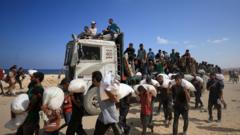Recent incidents have raised concerns over the safety of civilians seeking humanitarian aid amidst ongoing conflict, with claims of targeted shootings by Israeli forces reported near U.S. and Israeli-backed distribution points.
Dozens of Palestinians Killed by Israeli Gunfire at Aid Distribution Points in Gaza

Dozens of Palestinians Killed by Israeli Gunfire at Aid Distribution Points in Gaza
At least 32 individuals seeking food assistance lost their lives due to Israeli gunfire near aid sites in southern Gaza, as reported by a Hamas-controlled health ministry.
In a shocking escalation, at least 32 Palestinians were killed by Israeli gunfire while attempting to gather much-needed food supplies near two humanitarian aid distribution sites close to Khan Younis and Rafah in southern Gaza. This tragedy, confirmed by the Hamas-run health ministry, comes amidst growing tensions and violence in the region.
The U.S. and Israeli-backed Gaza Humanitarian Foundation (GHF), which oversees the aid distribution, stated that they did not witness any incidents impacting their sites but disclosed there had been Israeli Defense Forces (IDF) activity in the area several hours prior to the scheduled opening. Eyewitnesses, however, have disputed these claims, asserting that the Israeli fire appeared deliberately lethal rather than precautionary.
Reports indicate that the fatalities have occurred regularly since GHF's operations began in late May, with many of the deceased shot by Israeli troops. The IDF, addressing the latest incident, insisted that warning shots were fired to deter what they labeled "suspects" but contended that the shooting took place before the humanitarian sites opened.
Mohammed Al-Khalidi, an eyewitness, recounted a harrowing experience, alleging that the army's gunfire was meant to kill rather than to frighten. He emphasized that the military assault occurred as he and others were assured the aid distribution center was active.
The GHF employs private contractors to dispense aid from locations within military zones, with both Israel and the U.S. stating this approach is essential to prevent Hamas from misappropriating humanitarian supplies. In contrast, the United Nations has expressed ethical concerns about the arrangement and has refused to cooperate with the GHF, citing a lack of evidence that Hamas systematically diverts aid.
In a grim report from the UN human rights office earlier this month, approximately 674 deaths have been recorded in proximity to the GHF's facilities in southern and central Gaza over a six-week span, with an additional 201 fatalities noted along routes utilized by UN and various aid convoys.
The GHF rebutted these claims, labeling the UN statistics as misleading and criticizing them for relying on figures from Gaza's Hamas-led health ministry, which many consider a more accurate reflection of casualties.
Amid this turmoil, restrictions imposed by Israel have significantly exacerbated humanitarian conditions, with the number of acutely malnourished children in Gaza doubling since March. Despite the establishment of the GHF, critical supplies, including baby formula, remain blocked at the border.
Earlier this week, a field hospital's director reported an overwhelming influx of patients suffering severe exhaustion and malnutrition, with Hamas officials citing 69 child fatalities due to inadequate nourishment.
While discussions of a ceasefire have resurfaced, U.S. President Donald Trump suggested progress was imminent; however, Palestinian officials refuted claims of advancement, asserting that negotiations continue to be stalled by an unacceptable troop withdrawal proposal from Israel.
As another month of bloodshed and chaos unfolds, the humanitarian crisis in Gaza deepens, leaving the region's vulnerable population in dire straits.
The U.S. and Israeli-backed Gaza Humanitarian Foundation (GHF), which oversees the aid distribution, stated that they did not witness any incidents impacting their sites but disclosed there had been Israeli Defense Forces (IDF) activity in the area several hours prior to the scheduled opening. Eyewitnesses, however, have disputed these claims, asserting that the Israeli fire appeared deliberately lethal rather than precautionary.
Reports indicate that the fatalities have occurred regularly since GHF's operations began in late May, with many of the deceased shot by Israeli troops. The IDF, addressing the latest incident, insisted that warning shots were fired to deter what they labeled "suspects" but contended that the shooting took place before the humanitarian sites opened.
Mohammed Al-Khalidi, an eyewitness, recounted a harrowing experience, alleging that the army's gunfire was meant to kill rather than to frighten. He emphasized that the military assault occurred as he and others were assured the aid distribution center was active.
The GHF employs private contractors to dispense aid from locations within military zones, with both Israel and the U.S. stating this approach is essential to prevent Hamas from misappropriating humanitarian supplies. In contrast, the United Nations has expressed ethical concerns about the arrangement and has refused to cooperate with the GHF, citing a lack of evidence that Hamas systematically diverts aid.
In a grim report from the UN human rights office earlier this month, approximately 674 deaths have been recorded in proximity to the GHF's facilities in southern and central Gaza over a six-week span, with an additional 201 fatalities noted along routes utilized by UN and various aid convoys.
The GHF rebutted these claims, labeling the UN statistics as misleading and criticizing them for relying on figures from Gaza's Hamas-led health ministry, which many consider a more accurate reflection of casualties.
Amid this turmoil, restrictions imposed by Israel have significantly exacerbated humanitarian conditions, with the number of acutely malnourished children in Gaza doubling since March. Despite the establishment of the GHF, critical supplies, including baby formula, remain blocked at the border.
Earlier this week, a field hospital's director reported an overwhelming influx of patients suffering severe exhaustion and malnutrition, with Hamas officials citing 69 child fatalities due to inadequate nourishment.
While discussions of a ceasefire have resurfaced, U.S. President Donald Trump suggested progress was imminent; however, Palestinian officials refuted claims of advancement, asserting that negotiations continue to be stalled by an unacceptable troop withdrawal proposal from Israel.
As another month of bloodshed and chaos unfolds, the humanitarian crisis in Gaza deepens, leaving the region's vulnerable population in dire straits.




















